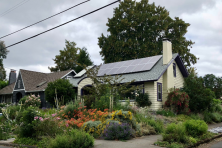Oregon has made incredible strides in cleaning up our electric grid and transportation sector through milestone policies in recent years. The buildings sector — Oregon’s second biggest source of climate pollution — requires similar cornerstone policies to set a framework that reduces pollution and energy waste and increases the resilience of our homes and buildings in the face of climate impacts. At the same time, Congress has recently passed historic legislation that will soon inject billions of dollars into climate resilience, clean energy, and infrastructure in Oregon. The combined investments of the Infrastructure Investment and Jobs Act (IIJA) and the Inflation Reduction Act (IRA) present a historic opportunity for Oregon to accelerate the transition to a clean energy economy, create family-wage jobs and address environmental injustice. The Legislature needs to act in 2023 to position Oregon to maximize the economic and climate potential of this once-in-a-generation funding infusion. Building upon the strong foundation of recent climate and clean energy policy wins in Oregon, this suite of priorities helps turn the promise of these policies into progress on the ground that meaningfully benefits us all.
Building Resilience Policy Package
Oregonians deserve healthy, affordable, resilient homes and buildings that run on clean energy. Right now, too many of our homes and workplaces put us at risk from the harms of climate change, like extreme heat and wildfire smoke. The way we heat buildings and water with fossil fuels is making things worse, especially for lower-income and frontline communities. A suite of policies emerging from the legislature’s Resilient Efficient Buildings Task Force will help reduce climate and air pollution from Oregon’s homes and buildings while increasing energy efficiency, affordability, and resilience and creating good jobs. Read our Resilient Building Coalition factsheet!
Healthy Heating and Cooling for All: (SB 868)
- Leverage new federal incentives and existing state programs to accelerate heat pump adoption and increase weatherization and retrofits;
- Set a state goal to get 500,000 new heat pumps installed by 2030, with a priority for low-income and environmental justice communities; and
- Align Oregon’s energy efficiency programs with state climate goals.
Pass a “Building Performance Standard” (SB 870)
- Reduce climate pollution and improve the energy efficiency of existing large commercial buildings over time. This policy represents a huge climate bang-for-its-buck while saving energy and improving indoor air quality.
Build Smart from the Start (new construction): (SB 869)
- Strengthen building codes to increase energy efficiency and resilience; and
- Encourage low-carbon building materials.
Smart State Buildings: (SB 871)
- Ensure public buildings walk the talk on Oregon’s efficiency and climate goals.
Key bills to accelerate Oregon’s 100% clean energy transition
As Oregon accelerates the transition to a carbon-free grid, we need to ensure the state’s clean energy policy is consistent and inclusive of some of the state’s largest energy users. We also want to ensure how we transition to 100% clean energy results in economic benefits for communities across Oregon and increases resilience in the face of growing climate impacts. As the state transitions toward a cleaner and more equitable transportation system, leveraging federal funding to reduce the upfront cost of replacing diesel trucks, delivery vans, and buses with zero-emission vehicles is critical. These goals are reflected in the following bills:
100% Clean Electricity for Big Tech (HB 2816)
Applies the state’s 100% clean energy targets for data centers and cryptocurrency mining operations whose power is not currently regulated by HB 2021 to ensure the state’s major energy users are transitioning from coal and gas to carbon-free power by 2040.
Read our factsheet!
Electric Truck Rebates (HB 2714)
Creates a Medium- Heavy-Duty Zero-Emission Vehicle Program that provides rebates for zero-emission vehicles like delivery trucks and buses and can attract and distribute anticipated federal funding.
Read our factsheet!
Utility Customer Protection (HB 3152)
Directs the Oregon Public Utility Commission to consider the climate in its decision-making. The bill also shifts the financial risk of expanding the fossil fuel system from residential utility customers to gas companies and their investors by ending the practice of using residential ratepayer funding to subsidize or incentivize new gas line extensions and new gas appliances after 2026.
Renewable Hydrogen (HB 2530)
Defines green electrolytic hydrogen. Directs Oregon Department of Energy to develop strategies to accelerate renewable hydrogen in a regionally-aligned, climate-smart way.
Microgrids and Rural Resilience (TBD)
Supports the development and adoption of microgrid systems to increase electric grid and energy resilience.
Other legislation supported by Climate Solutions
- Resilience Hubs (HB 2990) - Creates resilience hubs across the state to protect frontline communities from climate-fueled storms, heat waves, and wildfires; provide social services to support displaced and vulnerable community members.
- Develop State Energy Strategy - Directs ODOE to develop a State Energy Strategy.
- Natural Climate Solutions (SB 530) - Creates greenhouse gas reduction goals and program to sequester carbon on our forested and agricultural lands.
- Electric Bike Rebates (HB 2571) - Directs DEQ to establish a rebate program for the purchase of electric bicycles.
- Modifies Oregon Transportation Commission (HB 2619) - Expands OTC to a body of 9 and includes representation from youth, transit-dependent, native nation, and disability advocate.
- Cities’ Right to Electrify (HB 2713) - Supports local control for cities to regulate fossil fuels.
- State Climate Commission and GHG Goals (SB 522) - Modernizes Oregon Global Warming Commission and updates state climate goals.
- Clean Tech Procurement and Manufacturing - Promotes Oregon clean tech manufacturing while leveraging IRA/IIJA federal production tax credits.
- Renewable Diesel (HB 2826) - Task Force to support renewable diesel
- Electric Vehicle Incentive Fund (HB 2613) - Provides adequate funding to sustain state EV incentives, especially the Charge Ahead program.
- Strong Climate Budget and support for state energy, environmental, and natural resources agencies implementing Oregon’s climate and clean energy laws.
Contacts
Meredith Connolly, Oregon Director, meredith.connolly@climatesolutions.org
Jennifer Williamson, Strategies 360, jenniferw@strategies360.com





